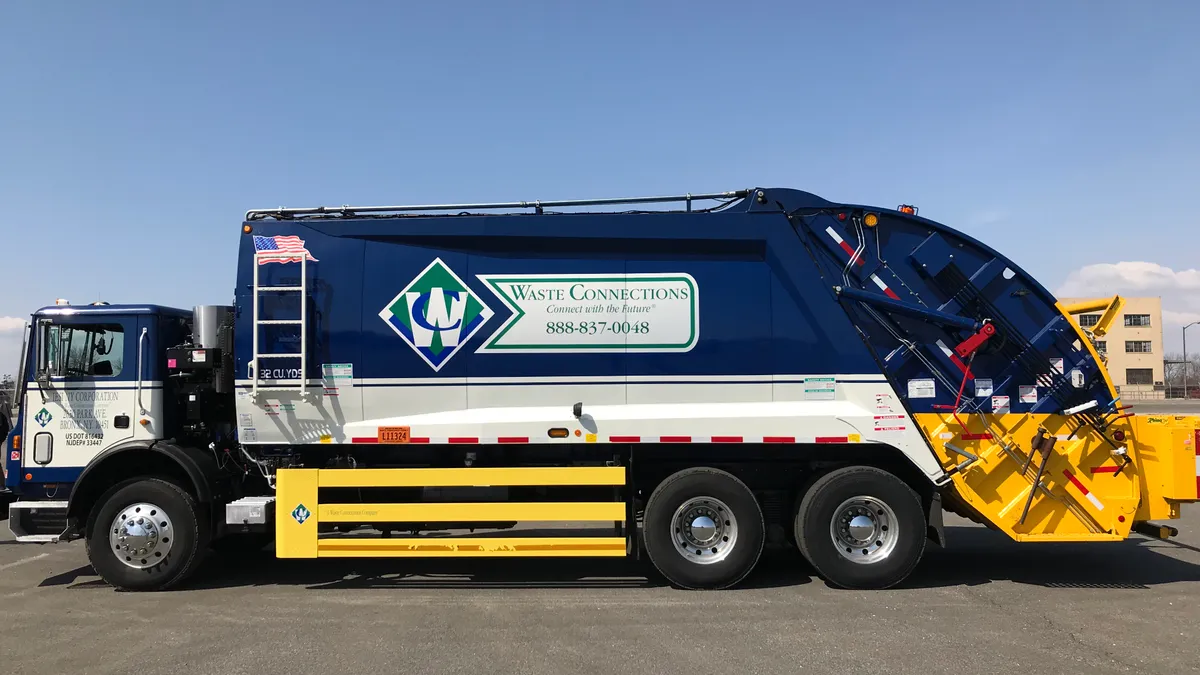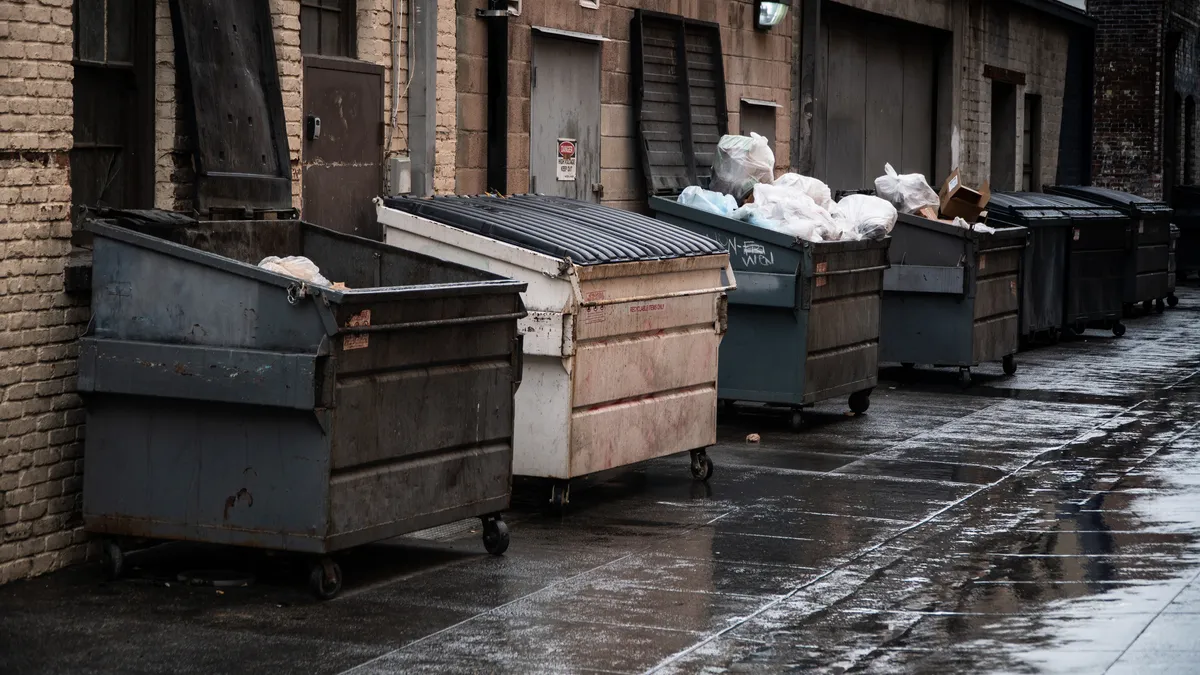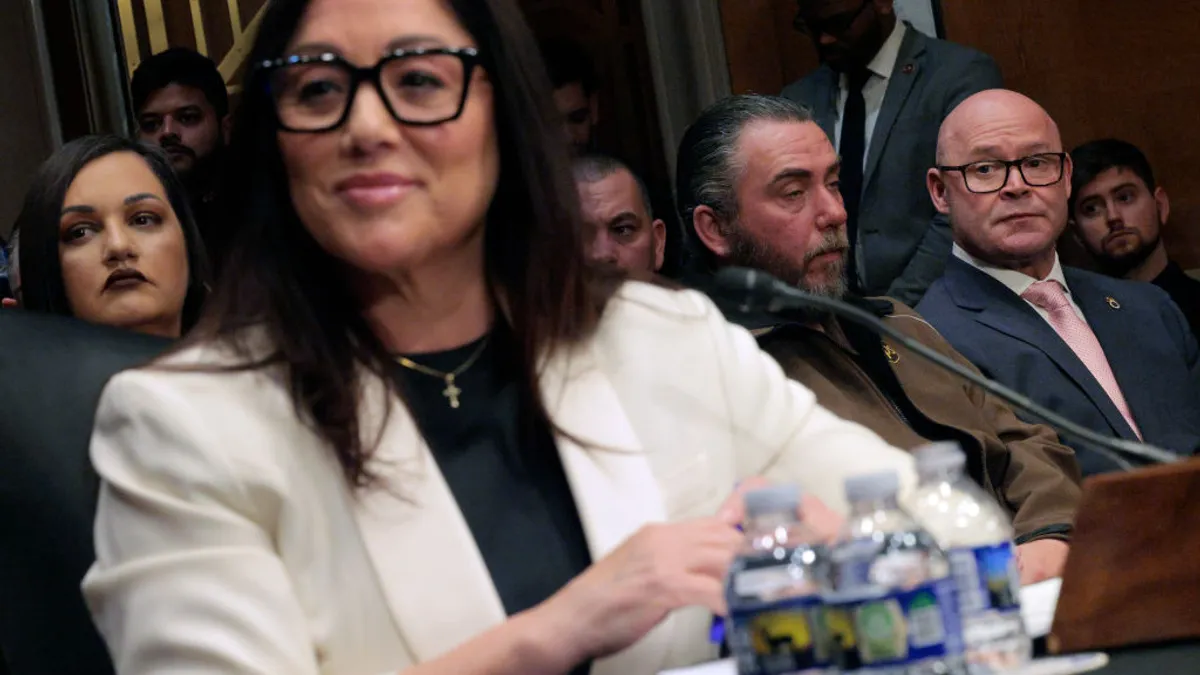Waste Connections has more than doubled in size over the past three years – from an estimated 7,000 employees to 18,000 – and the company is always looking for new ways to maintain its original culture amid that rapid growth.
"You can have a purposeful culture or an accidental culture," said President Worthing Jackman during the recent WasteExpo investor summit. "Human capital for us is what differentiates a winning company longer term."
While Jackman said the company has remained successful in maintaining that for its approximately 2,000 back office and management staff – including with the recent introduction of a customized MBA program – work is ongoing to reach front line employees.
Waste Dive met with Jackman to discuss labor trends, the company's outlook on recycling, potential for new climate-driven regulations and more. Jackman, who has been with Waste Connections for more than 20 years, was promoted from CFO to president in 2018,and has become its point person during CEO Ron Mittelstaedt's family-related leave of absence.
The following conversation has been edited for brevity and annotated for context.
WASTE DIVE: How has your role changed temporarily with Ron on a leave of absence?
WORTHING JACKMAN: So my role really hasn't changed, whether Ron's there or Ron's not. I think the biggest differentiation is moving from a CFO, which is more external-focused – meeting investors, bankers, things like that – to president, which is more internal-focused.
It's important as companies expand to never lose touch with the front line. We're reengaging with town hall meetings we used to do as a small company. Making sure we're never accused of being a big company, making sure you keep it familial, making sure you're keeping that front line touch, is more important now than ever. Making sure you're collapsing processes that generally expand as you grow and more layers get put in for approvals or other things. You've got to get back to quicker decision-making and get it back to what people remember.
Does that mean more autonomy at the regional level ? Maybe folks don't need as much from the C-suite because they're empowered to handle it on their own?
JACKMAN: We have six regions and a region is corporate in the field. Now, they play a fine line of one foot in the field and one foot playing a corporate role. So they have different things they have to focus on than just what corporate focuses on. But our job at corporate, or any leader's job, is so much easier if you can train the folks that work in the company to do your job.
They know what the right thing to do is, they'll make the right decision for the right reason. They're willing to be held accountable, they want to succeed individually. Again, we're not a high-level command and control siloed company where you need the C-suite to make decisions. You need the C-suite to challenge, you need the C-suite to focus on people and human capital. You need to make sure that we're making the right investments in technology or other areas.
But on the day-to-day, you've got to count on that local manager, the training development that he or she gets, and the levels between the local manager and you. Any local manager can pick up the phone and call me — this isn't, "Oh they can only talk to that level." That's this hierarchical big company structure that we never want to become.
You're getting bigger by the day. Does that reach a tipping point?
JACKMAN: We used to have one region and our view is that a region can effectively execute a decentralized model at that $1-1.5 billion of revenue. Well, now we have six regions, so we've got the bandwidth to continue to expand, and eventually we'll add another region and kind of re-balance ... and provide the runway for $7 or 7.5 billion in revenue.
Jackman goes on to discuss how the team hasn't "skipped a beat on anything we're doing" in Mittelstaedt's absence and turns back to the importance of ongoing employee development. .
[We want to make sure] we're getting as close to the front line as possible to push down that message, push down the culture, push down business acumen, push down competence. Development is the pendulum of competence on the one side and leadership on the other, and we swung so far over to leadership this past decade that I think it's important to let that pendulum come back to center and make sure we're not losing focus on competence, too, given how we've expanded so fast.
The conversation turns to current uncertainty around immigration policies. Jackman, like other executives, said that clear policies could likely broaden the labor pool. He also notes this could help the economy as a whole by boosting construction and other sectors. There is still a challenge, he notes, with attracting people of any kind. For those who join, Jackman describes waste as "a very rewarding industry" with a familial atmosphere, competitive pay and "gold-plated benefits."
Is labor one of the trickiest parts of an integration? Would it be fair to say you can bring all your processes to a new market, but sometimes there's just not enough people?
JACKMAN: In this economy, where you can run into that is some geographies that still want a three-man route. They want a rear-load, residential service ... So in markets where you have helpers as part of the service, because that's what the community requires – and you've got hiring standards versus some companies that will strictly use temp employees – that can pinch sometimes the number of heads that show up to work every day or that are willing to sign on.
[So] you're making decisions between safety and hiring standards that could impact a service business near-term, but pays you back exponentially long-term. Because you should want a higher quality work force, you should want a company that operates in the safest possible manner in your communities and that our workers go home at night as they came in.
So each transaction can bring its own unique, either labor challenges for you to get right or manager level or above, that you've got to move in to supplement what's going on.
I heard customers were getting notice in Virginia from American Disposal [which Waste Connections acquired in 2018] about service interruptions due to a driver shortage. Is that unique?
JACKMAN: I'm not aware of that notice ever going out before.
It may have been a heads up notice that the local team thought they should send, and I understand the struggles, because without a doubt everything they said is true. But it's just incumbent upon us to, in the near-term, put more resources in the marketplace to make sure routes aren't laid down, that the service is getting done.
Look, it's a wonderful management team, obviously very successful, and I think faced with that challenge historically they would have solved it themselves. In a toughening labor environment, boy, it's tougher to keep standards and say I'm going to solve it myself.
[There are] teams in place as we sit here talking today. But I think that's the benefit of being a part of a larger company versus trying to tackle that on your own — and learning that together we can be better than just one. So clearly we fell behind on that one; it got exacerbated with the yard debris season.
Last year, during WASTECON, Mittelstaedt told Waste Dive he could see recycling become a larger part of the company's revenue stream in the more distant future. During a recent earnings call, Jackman described that pace as more "evolutionary" than "revolutionary."
Are you waiting for the market to dictate that shift, or could we expect to see Waste Connections take a stance so to speak and offer more sustainability services?
Jackman points to the company's 2018 sustainability report, online here, as a sign of ongoing efforts.
JACKMAN: I'd separate recycling because that's just got its own influences on it right now versus other sustainability issues. It's really an all-of-the-above approach. Recycling for us is a lower percentage of our overall business than the larger peers, because we've always been purposeful in doing it where either regulation mandated it or where tip fees are high enough that there's an economic rationale to doing it.
Where companies have kind of strayed in that world, knowing that China will take anything, is they went into markets where it was not mandated and there were low tip fees and they just gave it away as a free service in order to just get rid of the waste to Asia. As I've said before, I said it on the [earnings] call, diversion doesn't mean divert it to China. So when this whole meltdown occurred in China, and Asia said no more, these companies were stuck with assets in markets where people, when they were asked to pay for it, said, "I don't want to pay for it. I want to be green, but I don't want to pay green."
So you've seen recycling operations get shut down by some of our peers. We haven't done that yet. You're seeing our peers use force majeure to help them in their discussions with municipalities. We haven't gone in and used force majeure. Our view is a long-term relationship with our customers. Three years ago, those same companies weren't going in and giving more rebates to the municipality because fiber was worth $200. Now that the basket is worth $30 or $40, and you throw in mixed paper, now they're asking for help. So you've got to take the good with the bad.
Jackman also cites investments in new MRF equipment and landfill gas-to-energy projects — as well as involvement with a new anaerobic digestion facility in San Luis Obispo, California — as signs of the company's sustainability commitment.
The conversation turns to how much the profitability of landfills, as compared to other-non collection assets, still influences the framework of what offerings are considered viable.
JACKMAN: [As] soon as you control the waste stream on a truck, whether it's going to a zero tip fee energy facility, a landfill or to another recovery modality operation – whether it be a recycling facility, compost, etc. – if you control the waste on your trucks, you've got a seat a the table. That's why we've always said collection and being customer-facing is much more important than just owning a landfill.
Because landfills without waste are a liability, and the majority of the waste in landfills come off your own trucks. So it goes back left pocket to right pocket to say, you've got to be successful on what you're doing on the collection side first and foremost.
Waste Connections has already been dealing with different environmental regulations in Canada for some time. As the climate conversation bubbles up in the U.S., do you foresee any changes to the way you may have to do business? Are there any climate risks to your assets?
JACKMAN: I don't see a risk to the assets. We always do see, though, that toughening environmental regulations tend to accelerate consolidation. Because a lot of folks say, "Look, I've got my net worth invested in this, I've owned this company second generation maybe. Do I want to double down again, borrow the money to make capital investments to adapt to changing technology or regulatory environment?" Generally, when that's happened, you've had a further consolidation wave in the industry. Because larger well-capitalized companies have the wherewithal, the resources and the experience to step up to those things.
A lot of the geographies in the U.S. [where we operate] are a lot like Canada and are already heavily regulated. And so the cost for those sorts of initiatives are already embedded or can be embedded within the rate structures for what they want to accomplish.
Has service disruption from the flooding events, wildfires and hurricanes in recent years become business as usual, baked into the plan — or does that add cost?
JACKMAN: [It] can cause some volatility when that happens and when it doesn't happen, because you anniversary it. Obviously catastrophes or unexpected disasters cause hardship on employees, so you've got to stand ready to support your employees. We've got a relief fund that when an employee gets impacted by some of the disasters you mentioned, we're there day one to help the family and get them through it. That's critical.
But no, I'd say our greatest challenge is head count, as we started talking about – personnel and human capital. Because if we've got that resolved, there's no disaster we can't overcome.
So, to conclude, any potential regulations that could come of this, you think your landfills are well-equipped to evolve? Waste Connections is ready for whatever shift comes with the climate crisis?
JACKMAN: Oh, absolutely. Because, by the way, landfill ownership and operation is highly regulated.
And so first and foremost, stay in compliance with regulations, and you're prepared for whatever the changes might be. Whether in Canada or on the West Coast, we participate in some of the more active markets around these topics. That's why I'd say I think we're well prepared for it — because we've been living it.





















